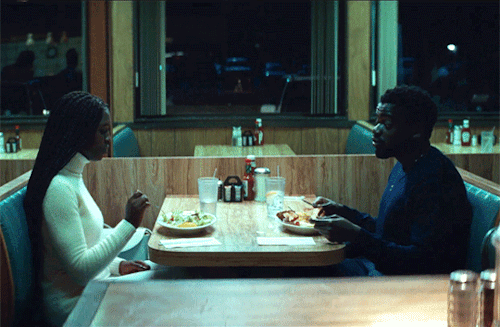For too many black people, being an outlaw is just a part of life. Unlike Bonnie & Clyde or other white outlaws held up as American icons, the simple act of walking home with iced tea and Skittles could make a black man an outlaw. Selling cigarettes on the corner is an intolerable act of defiance. Simply living in this world marks black men as outlaws, so the traditional narrative really doesn’t apply and needs to be reimagined.
Melina Matsoukas and Lena Waithe’s Queen & Slim is a film that seeks to rewrite the outlaw narrative through the black experience, forged inevitably through racism. Fittingly, it’s everyday, common occurrences that prove treacherous. A seemingly forgettable Tinder date between an unnamed couple (Daniel Kaluuya and Jodie Turner-Smith) turns deadly during what should be a routine traffic stop. An act of self-defense sends the couple fleeing from Cleveland through the deep South, encountering swaths of black life that most will never see: a prison chain gang working in the fields under armed guard; a Kentucky juke joint with a receptive clientele; a war veteran-turned-pimp in New Orleans.
Penned by Waithe from a story she got from discredited writer James Frey (How that happened I’d like to know), Queen & Slim struggles for profundity at nearly every turn, when it doesn’t really need to. The duo’s journey crosses more than geographical boundaries; they encounter black people of many different ideologies, economic status, and more. Along the way, they become mythological heroes, symbols of rebellion against an oppressive system. But as their status constantly evolves, Waithe’s screenplay can’t really keep up. While the interactions between Queen and Slim are flirty, soulful, and often revealing, too often they are left to recite long, overdone monologues explaining every emotion they have at that moment. It puts a damper on the already-extravagant 132-minute runtime, during which the characters become shaped by an inconsistent narrative unsure of what it wants to say.
A prime example is during woefully miscalculated scene intercutting Queen and Slim’s first sexual encounter with a violent standoff between protestors and police. That protest ends in tragedy so baffling it throws the entire movie out of balance and it never really recovers. It might’ve been clearer if so much of Queen & Slim was left out of context, but we are kept in the dark about so much. The way our heroes are perceived by the world at large is virtually unknown, especially in light of their clear act of self-defense, but also we learn so little about them as people. He’s a Christian, she’s not; he’s laid back and a little naïve, she’s got a militant streak that pops up when the story needs it to.
Fortunately, Waithe doesn’t turn the outlawed heroes into actual outlaws. This isn’t a wild, gunslinging shoot ’em up where they go on some crazy murder spree. They are instead allowed to mostly go through their journey unmolested, learning to live, laugh, and love while dealing with the burden placed upon them by their predicament. The film is at its best when Queen and Slim are just allowed to exist and be seen, to discuss music with one another (Fat Luther or Skinny Luther?), to dance, to share a homecooked meal, to discuss a future they both know is doomed. In these moments, we see them coping with the changes forced upon them. In some cases they bend to evolution’s will, cutting their hair (a significant act in black culture) to avoid capture. Other times they fight against it defiantly, holding on to some small semblance of who they were before that fateful traffic stop.
Queen & Slim joins a growing genre of films seeking to contextualize black rage at a an unjust legal system, corrupt law enforcement, and institutional racism as high up as the White House. While the film often fails to harness that anger into a cohesive theme, its vital existence is a ringing indictment of the world as we know it.






